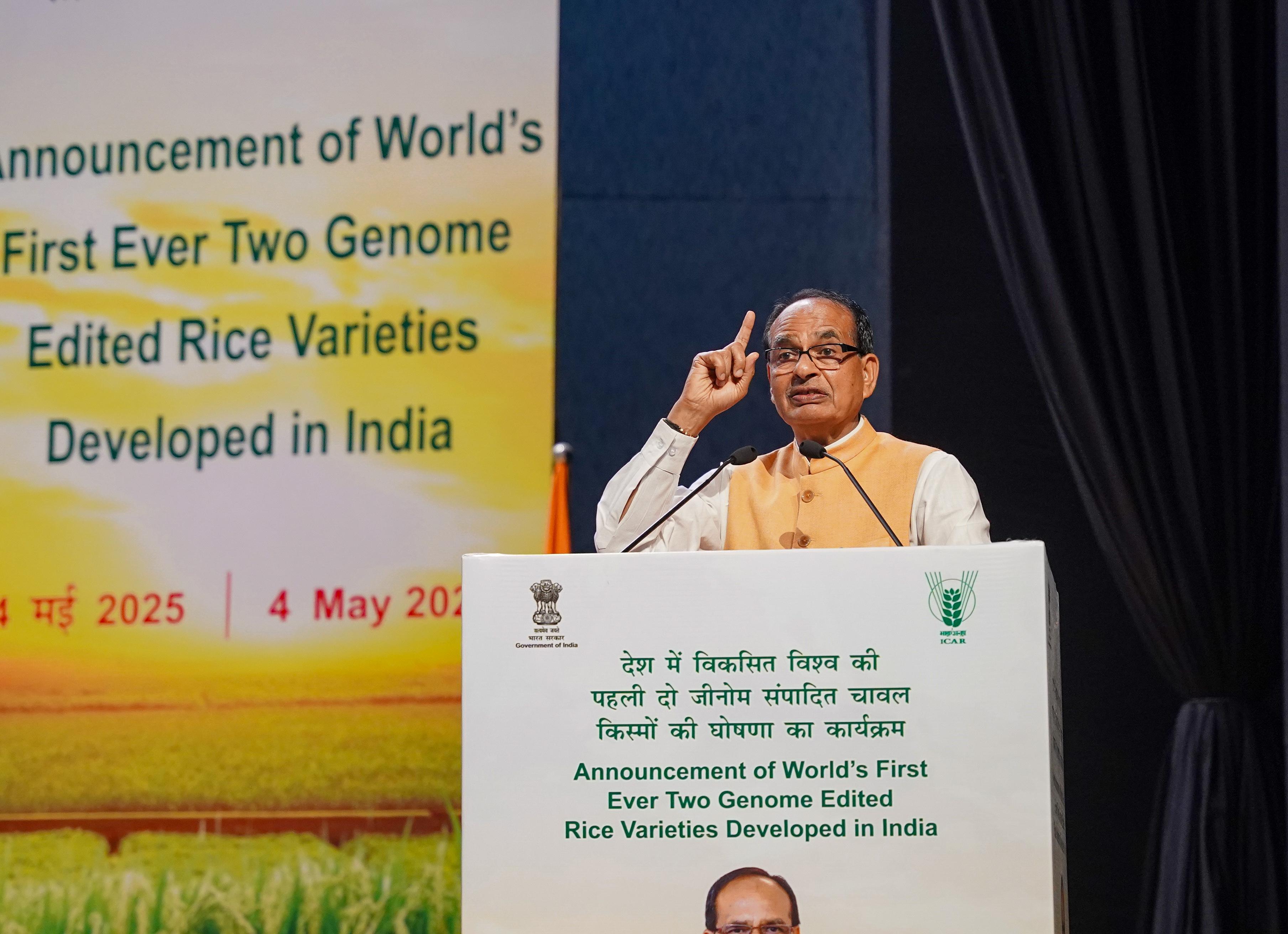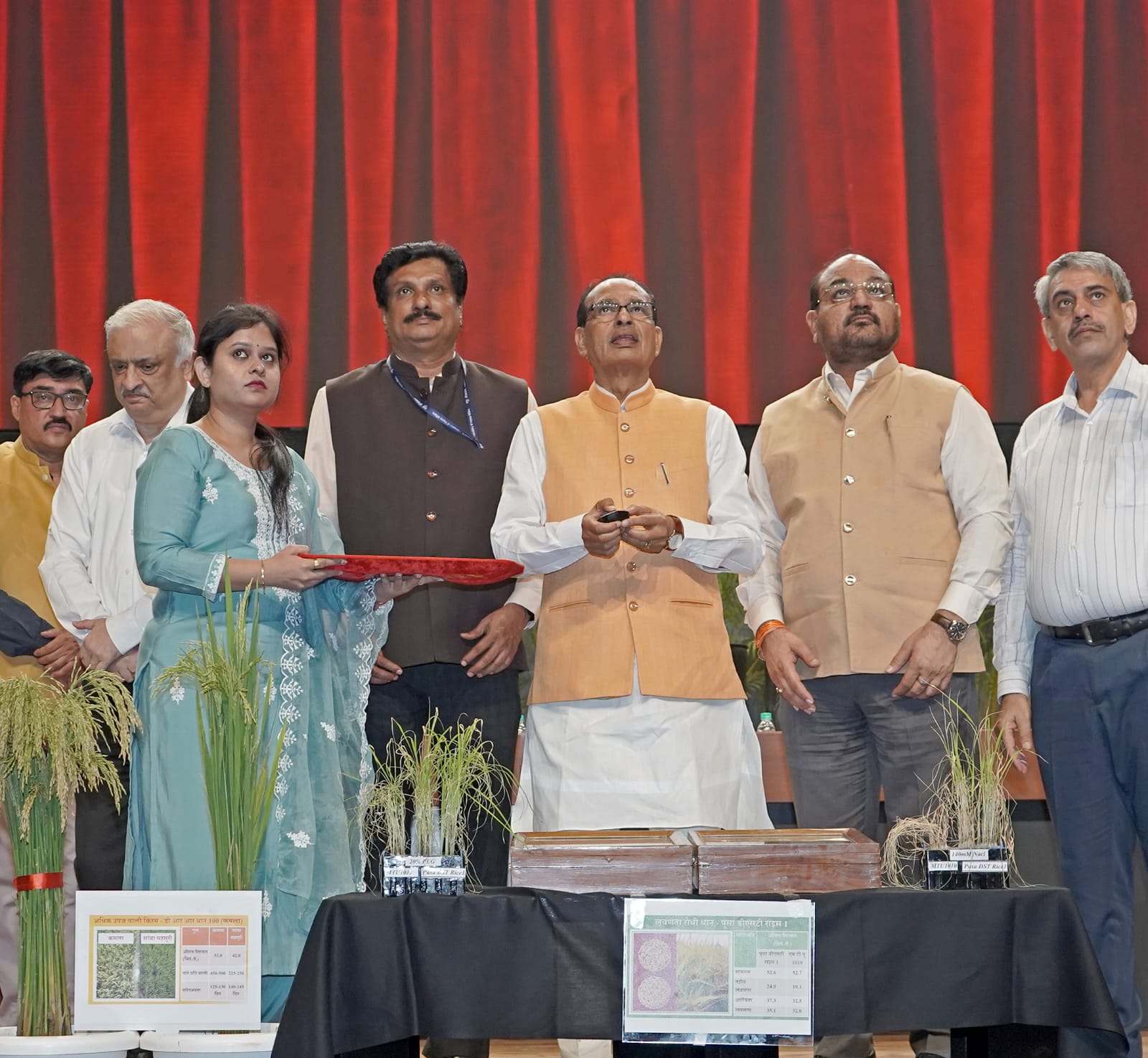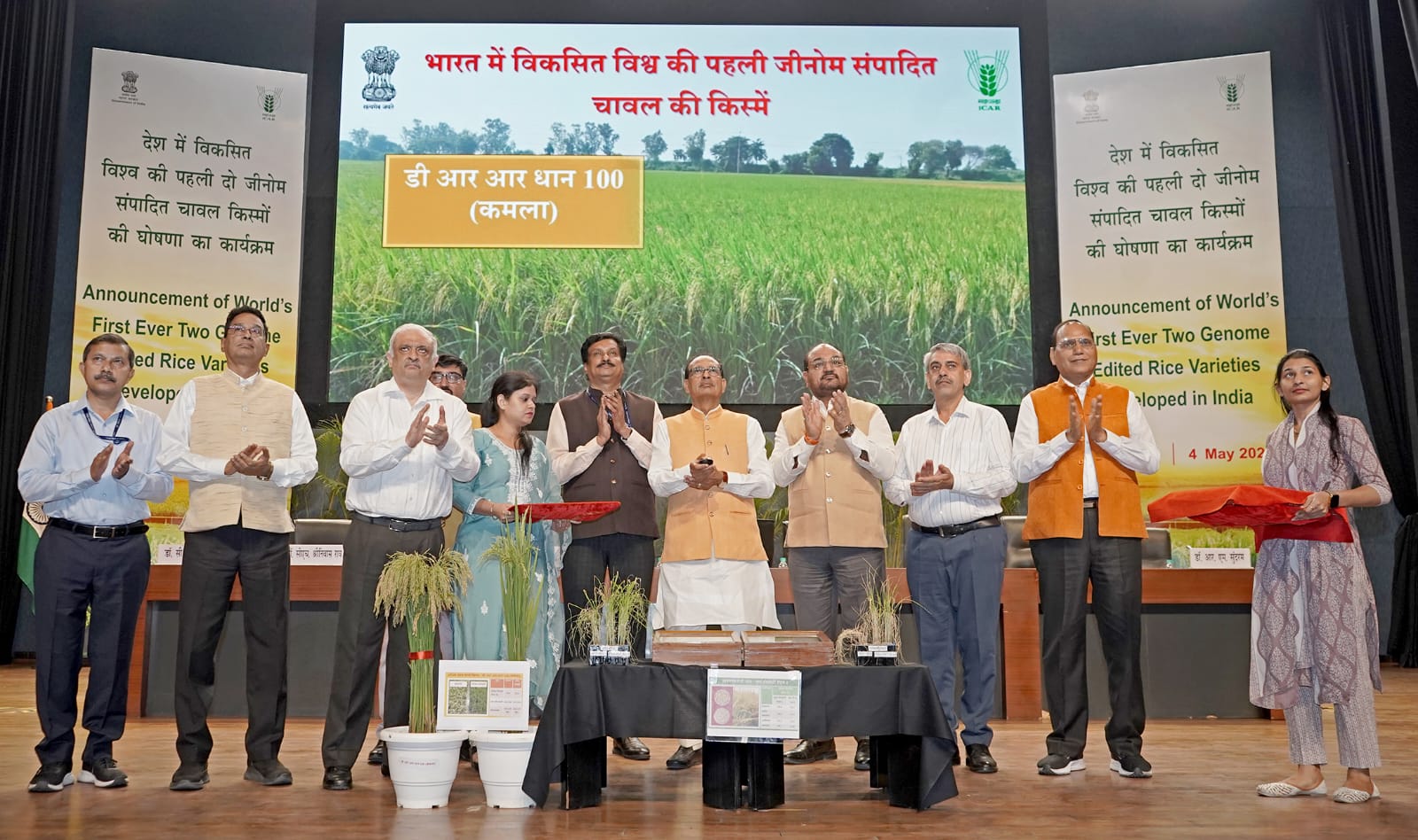Ministry of Agriculture &
Farmers Welfare
Union Agriculture Minister Shri Shivraj Singh Chouhan Announces Two Genome-Edited Rice Varieties Developed in India
India Becomes the First Country in the World to Develop Genome-Edited Rice Varieties
The new genome varieties hold the potential for revolutionary changes in higher production, climate adaptability, and water conservation
Posted On:
04 MAY 2025 5:58PM by PIB Delhi
Key Highlights:
- "Under the leadership of Prime Minister Shri Narendra Modi, India has achieved a historic milestone in scientific research," said Shri Shivraj Singh Chouhan.
- "Under the guidance of the Prime Minister, agricultural research has been given a new direction," added Shri Chouhan.
- "This is a golden opportunity for the agriculture sector," stated Shri Shivraj Singh Chouhan.
- "These new varieties will play a leading role in heralding the second Green Revolution," emphasized Shri Shivraj Singh Chouhan.
Union Agriculture and Farmers Welfare Minister Shri Shivraj Singh Chouhan today announced the development of two genome-edited rice varieties, in India, at Bharat Ratna C. Subramaniam Auditorium, NASC Complex, New Delhi. This marks a new beginning in the field of scientific research and innovation. A large number of scientists and farmers attended the event.

Addressing the gathering, Shri Shivraj Singh Chouhan said, "Under the leadership of Prime Minister Modi, India’s vision for a developed nation is being realized, and farmers are moving towards prosperity. Today’s achievement will be written in golden letters. During the Azadi Ka Amrit Mahotsav, Prime Minister Modi had called upon farmers to adopt modern techniques to overcome agricultural challenges. Inspired by his words, ICAR scientists have made exceptional achievements in the field of agriculture with the creation of these new varieties."

He further said that the development of these new crops will not only enhance production but will also yield positive results in environmental terms. It will save irrigation water and reduce greenhouse gas emissions, thereby lowering environmental pressure. This is a classic example of getting both benefits – increased production and environmental conservation.
Shri Chouhan emphasized that in the coming times, there is a need for ensuring food security, increasing nutritious production, and providing food for both India and the world, while making India the food basket of the world. He stated, "We are proud that our efforts have led to the export of 48,000 crore worth of Basmati rice annually."
The Minister also urged the need to take further steps to increase production of soybean, arhar, tur, lentils, urad, oilseeds, and pulses.
Shri Chouhan also introduced the "Minus 5 and Plus 10" formula, explaining that it involves reducing the area of rice cultivation by 5 million hectares while increasing rice production by 10 million tons in the same area. This would free up space for the cultivation of pulses and oilseeds.

He urged the farmers, especially the young farmers, to adopt advanced farming techniques. Shri Chouhan said, "We need to take agricultural research to the farmers. When agricultural scientists and farmers come together, miracles will happen."
Shri Bhagirath Choudhary, Union Minister of State for Agriculture and Farmers Welfare, virtually congratulated the scientists.
Shri Devesh Chaturvedi, Secretary, DA&FW, MoEF&CC, highlighted that the new varieties announced by ICAR today could be a game-changer for Indian agriculture:
Dr. M.L Jat, Secretary (DARE) and Director General (ICAR), emphasized the importance of demand-driven research, highlighting the need to gather feedback from farmers about their specific requirements. This approach will ensure that research outcomes are tailored to meet the needs of farmers and effectively reach them with the right solutions.
On this occasion, the Minister honored the scientists who contributed to the research of the two varieties. Dr. Vishwanathan C, Dr. Gopal Krishnan S, Dr. Santosh Kumar, Dr. Shivani Nagar, Dr. Archana Vats, Dr. Soham Ray, Dr. Ashok Kumar Singh and Dr. Pranjal Yadav, were honored for their work on Pusa DST Rice 1. Dr. Satyendra Kumar Mangruthia, Dr. R.M. Sundaram, Dr. R. Abdul Fiyaz, Dr. C.N. Neerja, and Dr. S.V. Sai Prasad were honored for their contribution to the development of of DRR Rice 100 (Kamla).
KUNG.jpg)
Dr. Devendra Kumar Yadava, Deputy Director General, (Crop Science) ICAR, Dr. R.M. Sundaram, Director, ICAR-Indian Rice Research Institute, Hyderabad, Dr. Ashok Kumar Singh, Former Director, ICAR, and Dr. C.H. Srinivas Rao, Director, ICAR-IARI also addressed the event.
Background:
ICAR has developed India’s first genome-edited rice varieties – DRR Rice 100 (Kamla) and Pusa DST Rice 1. These varieties have the potential to bring about revolutionary changes in terms of higher production, climate adaptability, and water conservation.
These new varieties were developed using genome-editing technology based on CRISPR-Cas, which makes precise changes in the organism's genetic material without adding foreign DNA. Genome editing of SDN 1 and SDN 2 types of genes has been approved under India's biosafety regulations for general crops.
In 2018, ICAR initiated genome-editing research to improve two major rice varieties – Samba Mahsuri and MTU 1010 – under the National Agricultural Science Fund. The outcome of this research is the two advanced varieties that offer the following benefits:
- A 19% increase in yield.
- A 20% reduction in greenhouse gas emissions.
- A saving of 7,500 million cubic meters of irrigation water.
- Improved tolerance to drought, salinity, and climate stresses.
The DRR Rice 100 (Kamala) variety was developed by ICAR-IIRR, Hyderabad, based on Samba Mahsuri (BPT 5204). Its objective is to increase the number of grains per panicle and it matures 20 days earlier (~130 days). Due to its shorter duration, it helps save water and fertilizers and reduces methane gas emissions. Its stalk is strong and does not fall. The rice quality is similar to the original variety, Samba Mahsuri.
The second variety, Pusa DST Rice 1, was developed by ICAR-IARI, New Delhi, based on MTU 1010. This variety can increase yields by 9.66% to 30.4% in saline and alkaline soils, with the potential for up to 20% increase in production.
These varieties have been developed for states such as Andhra Pradesh, Telangana, Karnataka, Tamil Nadu, Puducherry, Kerala (Zone VII), Chhattisgarh, Maharashtra, Madhya Pradesh (Zone V), Odisha, Jharkhand, Bihar, Uttar Pradesh, and West Bengal (Zone III).
The development of these varieties is a significant step toward India’s goal of becoming a developed nation and promoting sustainable agriculture. In the 2023-24 budget, the Government of India allocated ₹500 crores for genome editing in agricultural crops. ICAR has already initiated genome-editing research for several crops, including oilseeds and pulses.
*****
PSF/SRK/A
(Release ID: 2126802)
Visitor Counter : 971